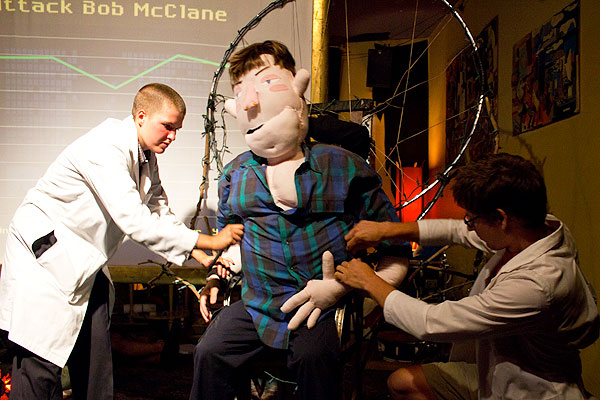Syllabus Share
I developed this class. Now, I am teaching it.
ENGL 534: Form & Technique in Fiction
Reading Outside of Fiction
COURSE DESCRIPTION
As writers, it’s important that we gather inspiration from a broad array of sources. Often, between coursework and personal interest, it’s impossible for us to read as widely or diversely as we could, and it’s often outside of the discipline of creative writing and literature that we gain the most inspiration. In this course, we will read from a variety of disciplines and use the knowledge to generate prose. The texts you will encounter in this course may be difficult. It isn’t important to understand every word. It is even less important that you “like” it. What matters is that you use it to generate new material.
Chief Keef on Writing

“I’m ’bout to go in, like, two seconds.”
“I don’t really use metaphors or punchlines, ’cause I don’t have to. I’d rather just say what’s going on right now. Real talk.”
“Please don’t write no fuck-shit.”
“It’s like candy, eating candy, a lot of candy. Or something.”
“Haters is fans. Like Louie said, ‘Let’em talk: it’s advertising.'”
“Keep working. I worked for a long time. Instead of saying I want to grow up to be a police officer, I want to grow up to be a firefighter, I want to grow up to be a doctor, a lawyer—I made this a goal.”
“I don’t know who to listen to.” READ MORE >
Fwd: Hipsters of Brooklyn (NY) / RealityTV / NonUnion
| Casting Notice | |
| Project Name: | Hipsters of Brooklyn (NY) |
| Project Type: | Reality TV |
| Rate/Compensation: | na |
| Requesting Submissions From: | New Jersey, New York, Puerto Rico |
Role Type: Principal
Gender: Male or Female / 19 to 32 / All Ethnicities
Description:
For HIPSTERS ONLY (a Hipster is not “Hip Hop”): They typically live in Williamsburg and are overeducated, snobbish, androgynous, intellectual, liberal, artsy, trust fund kids and dress funky…or at least fit this prototype! We are looking for great CHARACTERS…Hipsters that have HUGE personalities: If you are an obnoxious jerk and curse often please show this. If you are snobbish and mean please show this.
Kim Kardashian on Writing
“I think my sense of style is evolving.”
“I don’t really have goals as far as, I want to be on a cover or something like that.”
“I play into the perception of me, but it’s not really me.”
“I am hands-on in any project that I am associated with. I just don’t want to put my face or name and lend it to a product that I’m not behind a hundred percent.”
“I always say you shouldn’t weigh yourself. I don’t even have a set of scales in my house.”
“I am fascinated by crime scene investigating. I swear, I wish I was a crime scene investigator sometimes!”
“Botox to me is not surgery.”
“I am really cautious about what I say and do.”
“I want to be a vampire. I kind of want to be evil.” READ MORE >
7 Blowfish Memoirs
1.
I am interested in life only in its absurd manifestation. I find abhorrent heroics, pathos, moralizing, all that is hygienic and tasteful … both as words and as feelings.
3. Mountain climber/author tells Random House to stick it over royalties for ebooks.
7.
Suddenly it was as if I’d been getting my ass kicked in an alley somewhere and realized I’d had one arm behind my back. All of my natural abilities, I saw, had been placed, by me, behind a sort of scrim. Among these were: humor, speed, the scatological, irreverence, compression, naughtiness. All I had to do was tear down the scrim and allow those abilities to come to the table.
4. New Diagram is up, you smoke-shows and over-fogged brothers.
5. Interview with founders of Recommended Reading, and you should probably go byno-border (with your gaze) recommended readings anyway I mean if you’re not at this time already.
6. This is pretty great about Daniil Kharms. It’s not brand new but I don’t really care if it follows all the rules of blogs (?) and it seems to me you can post what you want and how or whatever when discussing Mr. Kharms. I think he writes like whales (killer) sneeze.
6. Here’s a really bad poem.
How To Be A Critic (pt. 1)
There is a moment at the very end of this Vice documentary called True Norwegian Black Metal where the subject of the film, Gaahl of Gorgoroth, says ominously, “I don’t think that you ask me the right questions. I don’t think you’re focusing on what’s being told.”
The interviewer responds, “Guide me.”
Gaahl then proceeds to zone out for three long minutes. His eyes remain open, but his expression becomes blank as a corpse. The filmmaker wisely resists cutting the camera or prompting Gaahl to speak. Instead, we are forced to watch him. At the end of his silent stare his eyes widen dramatically. Without speaking, he shifts his stare to the interviewer and raises his wine glass to his lips.
We await a response. Nothing happens. We await an explanation, a moment of clarity, resolution, some type of understanding. None is revealed.
“Don’t ask what it means or what it refers to,” the artist Eva Hesse famously told viewers, “Don’t ask what the work is. Rather, see what the work does.”
The image of Gaahl’s face as he sits motionless. What does it do?
And in itself and
 “She comes to a rest in shadow. Above her is an overhang of chickenwire and tins. She freezes. Above her is a terrible shape, a jagged many-limbed thing, a tree tangled from the composites of aerials and tv innards, plastic extrusions like growths in its multipart trunk, thorns of glass and shattered plates. Its branches splay – finger after finger of tubing, and intricate wicked ribbing. Dangling from them like dirty dank foliage, like the skins of victims, are dish clothes, and umbrellas’ countless ripped canopies. Nylon in dinged colours.”
“She comes to a rest in shadow. Above her is an overhang of chickenwire and tins. She freezes. Above her is a terrible shape, a jagged many-limbed thing, a tree tangled from the composites of aerials and tv innards, plastic extrusions like growths in its multipart trunk, thorns of glass and shattered plates. Its branches splay – finger after finger of tubing, and intricate wicked ribbing. Dangling from them like dirty dank foliage, like the skins of victims, are dish clothes, and umbrellas’ countless ripped canopies. Nylon in dinged colours.”
— from “The Flies That Bind” by “Jacques Francis,” The New Inquiry
“I used to compare everything in poems to metallic sheets of mica, the transparent fragments that flake off so easily. I never say I’m a poet; I just say “writer” and no one ever asks “a writer of what?” Once a man told me he was in the business of prosthetic limbs and I was speechless.”
— Stephanie Balzer, The Destroyer Vol 1.2
“We had a president living here once,
After he was president.
A famous animator lived here too.
We’d see him feeding the ducks.
This used to be a big duck town.
Ducks had a real voice.
Then one night they left for New Haven.”
— from “A Little Background” by James Haug, Connotation Press
November 29th, 2012 / 2:32 pm
Hmph
The moon is bright in this part of Massachusetts.
There is pie downstairs but nobody is eating it.
I was very drunk at one point. Now I don’t know.
People kept talking about money.
I can’t tell how much conversation about things I incited or what I might have said.
People kept talking about politics.
Everything seems fat and watery. I was in my dad’s shed in the backyard.
The Lions really fucked up, but it will have an asterisk if you think about it.
There’s always more to drink in the garage.
I walked to the high school and kicked four field goals. Some coaches came out of the locker room and looked at me. I looked at them and missed badly.
In the bed in my childhood room this morning I read the “Nausicaa” chapter.
I can’t tell if anyone fell asleep or got sick.
I downloaded five CDs of guitar music.
This isn’t what I planned to do while I was sitting on the toilet a few minutes ago.
Some people were walking around the track then drove home.
The pavement looks white from over here.
I remember I thought this morning I smelled.
ON THE LITERARY DETERRITORIALIZATION OF THE OCCULT
MAGICK IS SUCH my jam it’s the best. To intervene, to sculpt the forces in motion that lie ever behind all phenomena – I really don’t know how to work any other way. Even tho I suck at math, I’m pretty boss at jimmying an algorithm, noticing how the hidden variables shift and float. Numbers are less important than access to archetypes, gods as guides dropping this or that for us to notice, signposts and gestures, fleeting affinities that when frozen stand as nexus-objects multi-dimensional we can intuit beyond boundary. With the Will, that’s us – burning variable altering environment by manipulating the living furniture in the hidden room behind.
 The letter word the sign is never not a sigil. Given, there are greater and lesser degrees of involvement. Sometimes the immobility of the intent is monolithic and plinth-like, entirely discernible, or else it’s more about the splitting/rejoining of a designated grammar, terms or characters as place-holders for the energies contained therein, their recombinant effect resulting in whatever transcendent endgame is necessary to render organs null and of a single glowing body.
The letter word the sign is never not a sigil. Given, there are greater and lesser degrees of involvement. Sometimes the immobility of the intent is monolithic and plinth-like, entirely discernible, or else it’s more about the splitting/rejoining of a designated grammar, terms or characters as place-holders for the energies contained therein, their recombinant effect resulting in whatever transcendent endgame is necessary to render organs null and of a single glowing body.
Expression bunches and twists the only fabric, tears through veils, the silence, so that we might recalibrate, effect a given change, order what we know as Chaos and the rest of it.
One thing I’ve noticed is that literary writing by self-identifying occultists is often quite bad, even as (or because) it demonstrates its principles. On the other hand, literary writers who’re interested in the dynamics of occult philosophy and practice have generally produced exciting work.
The best example, my go-to guy, is Henri Michaux. More adept at watching his own imagination than any other artist I can think of, he explored inner worlds, wrote exorcisms, and all the time revealed his process. The most memorable piece in this vein is a malediction called “I AM ROWING”: READ MORE >
I’m sorry, Mario, but your cultural critique is in another castle: some thoughts on hipster irony
Last August I attended a live reenactment of Total Recall (the classic 1990 version, natch, not the remake). It was a deliberately shambolic affair, a loosely-focused variety show run by Everything Is Terrible and Odds N’ Ends, involving puppets, videos, intentionally bad acting, and dancing. It was, I suppose, what some would call “hip” or “ironic.”
At one point we watched a reedited version of one Total Recall‘s many chase scenes—the infamous escalator shootout where Arnold uses a bystander as a shield—now set to Drowning Pool’s “Bodies.” (You can watch the video here.) Which is about as cliched as it gets, but it totally works as comedy.
Part of what makes the video funny is that the Everything Is Terrible folks have upped the intensity of the Drowning Pool song: “Let the bodies hit the floor, let the bodies hit the floor … Oh, wait, they’re totally stepping on that dead guy’s squishy body—ick.” Here we must pause responsibly to acknowledge that Drowning Pool frontman David Williams has always stated that the song is not actually about “the violence thing,” but rather the “respect and code” of the mosh pit, or some such other bullshit. That hasn’t stopped Hollywood folk from using the song in numerous action movie trailers. Nor has it deterred legions of Drowning Pool fans from making their own YouTube versions.
In other words, the Everything Is Terrible video’s ironic effect depends on the pairing being a cliché. Like a lot of satirical and ironic art, it proceeds by imitating an otherwise naïve or sincere effect, then subverting it. (This is why “irony vs. sincerity” is often an unhelpful binary when thinking about phenomena like hipster irony or the New Sincerity; those scenes or movements aren’t strict artistic opposites, since they necessarily share a lot of their aesthetic maneuvers. Where they differ usually lies more in their degree of self-effacement, and in their authorial intention.)
Hipster irony is commonly perceived purely as dismissal: “You’re just making fun of Drowning Pool.” And there’s certainly truth in that—fuck Drowning Pool! But is that all there is? Because the EIT video, I think, and the entire Totally Recalled show, could be perceived as something more. Those behind the show, and those in attendance, I’d argue, were actually trying to appreciate “Bodies”—but in the only way they now can. Irony, in other words, allows hipster audiences to make use of material that would otherwise be off-limits to them.
It won’t surprise you that I want to turn here to Viktor Shklovsky, because he identified a concept that I think might help us. It is his concept of deterioration:




